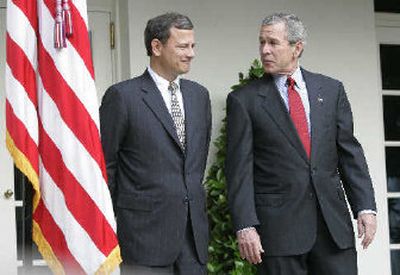Bush nominee seen as pro-business conservative

NEW YORK – Two unlikely opponents, a shopping mall and a hapless toad, could yield clues to John Roberts’ views on business.
As a federal appeals judge, President Bush’s nominee for the Supreme Court ruled in favor of a shopping mall developer who protested having to move a fence to accommodate the migratory movements of the endangered arroyo toad.
Roberts’ minority opinion – the toad ultimately won – signaled a willingness to keep the federal government out of local business affairs and limit Congress’ ability to regulate commerce. And that, business and law experts said Wednesday, will likely please pro-business conservatives.
Yet it appears that Roberts, as in other areas of the law, is not an ideologue when it comes to cases involving business. While a judge on the Federal Appeals Court for the District of Columbia Circuit, he agreed to quash music industry subpoenas that sought identities of alleged illegal music downloaders. Roberts and the D.C. Circuit also upheld the right for union activists to distribute handbills on “non-working” parts of an employer’s property.
And while a private attorney, Roberts represented several states in their 1998 antitrust suit against Microsoft Corp. and also represented microprocessor maker Intergraph Corp. in its 2000 antitrust appeal against Intel Corp.
“Obviously, he comes from the Republican side of the house, but my guess is that he plays it straight down the middle,” said Lawrence White, a professor at New York University’s Stern School of Business who studies the intersection of economics and law. But it is in Rancho Viejo v. Norton that Roberts has shown his constitutional leanings when it comes to business. The other two judges on the D.C. Circuit Appeals Court panel agreed that Rancho Viejo LLC, the shopping mall developer, had to adhere to the Endangered Species Act and make provisions for the migrating endangered toad.
Roberts said in his dissent that applying the act in this case was in conflict with the Commerce Clause of the Constitution, which says Congress has the power “to regulate Commerce with foreign Nations, and among the several States, and with the Indian Tribes.”
“The panel’s approach in this case leads to the result that regulating the taking of a hapless toad that, for reasons of its own, lives its entire life in California constitutes regulating ‘Commerce … among the several States,’ ” Roberts wrote.
Experts noted that Roberts did not want to strike down the decision; he advocated sending it back to a lower court so the Interior Department could find a better legal framework for helping the toad. Roberts nonetheless took a hard line on Congress’ power to regulate businesses operating solely within a single state and appeared to favor limiting the federal government’s powers in regulating business.
Other appellate court cases show Roberts will rule against big business should the law require it, experts said. Roberts and the court overturned a National Labor Relations Board ruling that prohibited union activists from distributing handbills on the property of ITT Industries Inc. Roberts joined his fellow judges in ruling that ITT could not bar employees from handing out the leaflets in the parking lot of another ITT facility, saying that outside, non-working areas of ITT property were fair game for union organizing activities.
And the D.C. Appeals Court reversed a lower court ruling that allowed the Recording Industry Association of America to subpoena Verizon Internet Services Inc. for the identity of computer users suspected of copyright infringement. Because the suspected files were stored on those individuals’ computers – and not on Verizon’s servers – Roberts and the court ruled that the subpoena was invalid.